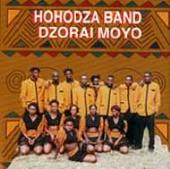Hohodza band consists of:
Portia P. Gwanzura and Simbarashe "Simba" Mudzingwa on lead vocals
A very well-polished group of male musicians and dancers
A selection of glamorous dancing queens - the girls also do the backing vocals
Our unique sound is a product of traditional and modern elements of music and style, fused with a solid electric rhythm section, giving the band an easily identifiable contemporary edge. It is the African Traditional type of music associated with hard-hitting beat from old beat, although ours is unique, in that it is a combination of low bass and newly composed beat.
Our fast-paced, highly danceable music features not only the rapid-fire guitar people have come to expect from Zimbabwean compositions, but excellent harmonies, as well.
Portia composes most of the songs herself and some are done by some of the band members. Our songs are written and arranged to suit dance routines performed in our Country and are meant to be very educational too.
When you experience Hohodza's music, you will experience a new feeling and rhythm that you will never forget.
The Meaning of "Hohodza"
"Hohodza" is the name for "woodpecker" in the Shona language. The woodpecker is a bird that hungers and craves for the true, old traditions. Wherever we perform, we quickly set our audiences alight with the feeling that there is the spirit inspiring our dances - the spirit of the woodpecker / Hohodza.
Our History
Hohodza band was formed in 1992 by Professor Portia P. Gwanzura. One of the main reasons that the band was started was to promote Zimbabwean culture, as well as to provide some kind of gainful employment for its members.
All of the members of Hohodza were exposed to music during their childhood, and therefore have a long musical background. Straightaway, the band put their heads together and dug through the dustbins of history to come up with age-old dance patterns and traditional music as a basic for their own unique compositions.
In Zimbabwe our live performances were strong and good. Our first show was at one of the most prestigious five star hotels in the capital city, Harare in 1992.
Equipped with our traditional instruments only we released our first album, Mudzimu Hautengwi, in 1995. At that time, the Zimbabwean music industry was dominated by many other musicians, but through the years, we matured to become real experts in the music Industry in Zimbabwe.
The Hohodza name became popular over the years because of our various albums and songs. Dande was released in 1996, and contained the blockbuster track "Chinyakare Makaisepi". Ndotamba Naniko, our 10th album, was released in 2002 and contained the following popular tracks: "Farai" and "Mudiwa". Some of our other albums include: Dzorai Moyo, Hupenyu, and Zvinoda Kushinga (which included the hit song "Gwengwendere").
Portia become the first black female musical promoter in Zimbabwean music. In 1997, she promoted a show that featured not only her band, but also one of Zimbabwe top stars, Oliver Mtukudzi and the Pied Pipers. She was also the president of the newly founded Zimbabwe Women Musicians Association that comprises female musicians such as Busi Ncube, Benita Tarupiwa, Mbuya Djoko and Tracy Zengeni. The association's aim was to promote women's musical groups in Zimbabwe.
In Zimbabwe we rose through the ranks to be one of the best bands in the country - we were voted the third best band in Zimbabwe in 1998. Besides Thomas Mapfumo and Oliver Mtukudzi, Hohodza are possibly Zimbabwe's most internationally successful group.
The Present & Future
We have played in South Africa, Belgium, England, Wales, and Holland. We have received wide acclaim at every venue and the reception has always been incredible. We touched people’s hearts - the shows were excellent - the experience was wonderful.
We have also shared the stage with some international artist like Clarence Carter from America, Koffi Olominde, Kanda Bongoman, Alan kounkue and Yondo Sister, who are all based in France, and other top African artists from around the world.
While on European tour, we had thousands attending our shows and we had similar audiences in Zimbabwe. The girls always keep the audience at their feet with their unique dancing antics.
When people come to our shows, we want them to get a feel of our traditional values, and when they leave we want them to feel as if they have just visited Zimbabwe and Africa.
We have released our eleventh album Chaitemura Chave Kuseva, the first to be released here in the UK.
